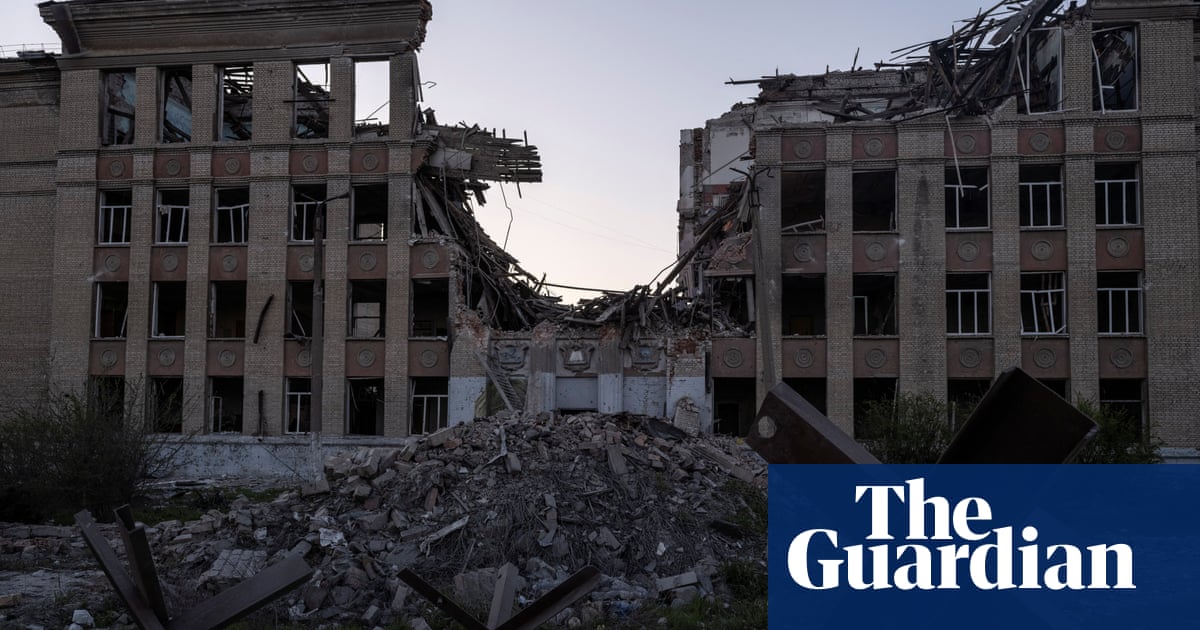Russia has continued its assault on Ukraine with a series of drone attacks and airstrikes, hours after US president Donald Trump cast doubt on Vladimir Putin’s readiness to end the conflict.
Three people were killed and four were wounded on Sunday morning in airstrikes on Kostiantynivka in the Donetsk region, according to the regional prosecutor’s office. In a drone attack on the city of Pavlohrad in the Dnipro region, a person was killed and a 14-year-old girl was wounded after a third consecutive night of assaults, local governor Serhii Lysak said.
US secretary of stateMarco Rubiodescribed the coming week as “very critical” for US attempts to end the war, telling broadcaster NBC that the administration would need to “make a determination about whether this is an endeavour that we want to continue to be involved in”.
He was speaking after what was described in diplomatic circles as a potentiallyhistoric meetingbetween Ukraine’s leader, president Volodymyr Zelenskyy, and US president Donald Trump, albeit only a 15-minute conversation, on the sidelines of the funeral of Pope Francis on Saturday.
In a social media post sent during his flight back to the US afterwards, Trump suggestedRussia was not committedto negotiating a ceasefire.
“There was no reason for Putin to be shooting missiles into civilian areas, cities and towns, over the last few days,” he wrote. “It makes me think that maybe he doesn’t want to stop the war, he’s just tapping me along.” He also implied that he was considering further sanctions againstRussia.
The meeting had been the two men’s first encounter since their highly antagonistic confrontation in the Oval Office two months ago.
Russia’s foreign minister, Sergei Lavrov, said that Russia would not cease to target sites used by the Ukrainian military, including those involving European contributions to aid Kyiv or connected to foreign fighting forces. He claimed in an interview on CBS’s Face the Nation that a residential building in Kyiv last week, which was hit by a Russian missile killing at least 12, had not been an “absolutely civilian” target.
“We will continue to target the sites used by the military ofUkraine, by some mercenaries from foreign countries and by instructors who the Europeans officially sent to help target Russian civilian sites,” he said in the interview, which was recorded on Thursday.
Zelenskyy denied Moscow’s claims made on Saturday that Ukraine’s army had been forced out of Russia’s Kursk region. “Our military continues to actively defend the designated areas of the Kursk and Belgorod regions,” he wrote on Telegram, admitting that the situation remained difficult in those, and many other, areas.
Ukraine’s army has dismissed as “propaganda tricks” Russia’s claims to have carried out the “full liberation” of the Kursk region, where Ukraine made considerable gains during a surprise offensive in August 2024.
Zelenskyy said that the tense situation on the frontlines and the position of the Russian army were an indication of the inadequacy of the “current pressure on Russia to end this war”. He said that increased pressure on Moscow could bring about more opportunities for “real diplomacy”.
Meanwhile in Moscow, a man suspected of killing a Russian general in a car bomb explosion on Friday has said he was paid by the Ukrainian security service to carry out the deed, according to Russian authorities who said he has pleaded guilty to terrorism charges.
Ignat Kuzinsaid he had received payment from Ukraine for killing gen Yaroslav Moskalik, a deputy head of the main operational department in the general staff of the Russian armed forces, who died just outside Moscow on Friday after a car bomb exploded as he was walking past.
Ukraine has yet to respond to the accusations that it was involved in the second attack of its kind in four months in which a high-ranking Russian military officer was killed.
Asked in his Sunday appearance on NBC’s Meet the Press about possible concessions to Russia, Rubio stressed the need to be “grownups and realistic”.“There is no military solution to this war. The only solution to this war is a negotiated settlement where both sides are going to have to give up something they claim to want and are going to have to give the other side something they wish they didn’t,” he said.
